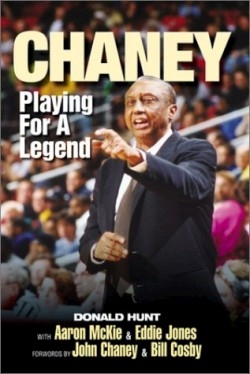Chaney
Playing for a Legend
Love him or hate him, basketball fans have to admit that John Chaney gets results. His sense of discipline and devotion to the game and his players has kept the Temple University Owls in contention for NCAA glory since he took the helm in 1982.
The author, a sportswriter for the Philadelphia Tribune, collaborated with two Owls alumni (both current members of the NBA) on this tribute to their mentor. McKie, who now plies his trade for the Philadelphia 76ers, and Jones, of the Miami Heat, are products of Chaney’s system, which demands discipline not only on the court, but also in the classroom. Owls’ practices commence at 5:30 a.m., but that’s no excuse for slouching on the course load.
This exacting schedule is too much for some. For others, whether they go on to the professional ranks (a statistically improbable chance) or to “merely” obtain a degree, the authors credit their coach with tremendous influence.
Chaney himself was an All-American player during his college days. Because of the tenor of the times, however, he had to content himself with being a seven-time All-Star and a two-time MVP in the Eastern League: black players weren’t allowed in the NBA during the 1950s.
He has a reputation as a tempestuous coach, to be charitable. While not on the level of a chair-throwing, player-throttling, referee-baiting Bobby Knight, Chaney has had moments where he has menaced opposing coaches, much to his present regret. In fact, despite his success in lower-division schools, Chaney didn’t start coaching “major” college basketball before he was fifty, which makes his story even more remarkable: in his twenty years at Temple, he has guided the Owls to a record 468 wins and 210 losses, good for seventeen NCAA Tournament appearances.
The authors praise Chaney’s sense of decency and devotion to his athletes. He has been a steadfast opponent of certain NCAA rules that make it difficult for some inner-city students to attend college. Proposition 42, for example, sets minimum SAT scores for student athletes to qualify for scholarships, a rule passed just in time to force McKie and Jones to take out student loans. “[Chaney] felt as though the requirements were unfair to poor, inner-city youngsters,” writes Hunt. At the same time, it served as their motivation to do well in their studies.
Hunt’s prose mixes with “Aaron’s Thoughts” and “Eddie’s Thoughts,” which tend to give the book a somewhat clunky flow. The appendices, further testimonials to Chaney’s popularity, seem superfluous. Nevertheless, the book is a well-deserved tribute to a well-respected coach.
Reviewed by
Ron Kaplan
Disclosure: This article is not an endorsement, but a review. The publisher of this book provided free copies of the book to have their book reviewed by a professional reviewer. No fee was paid by the publisher for this review. Foreword Reviews only recommends books that we love. Foreword Magazine, Inc. is disclosing this in accordance with the Federal Trade Commission’s 16 CFR, Part 255.

